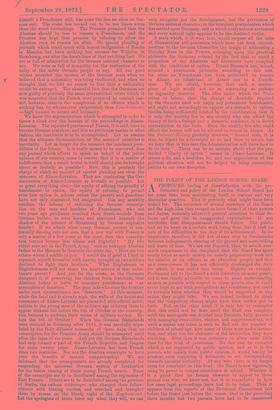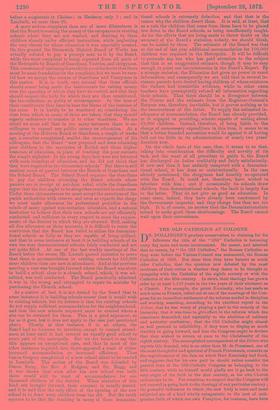THE POLICY OF THE LONDON SCHOOL BOARD.
APROFOUND feeling of dissatisfaction with the per- formance and policy of the London School Board has for some time been manifesting itself in various and very dissimilar quarters. This is precisely what might have been looked for. The eminence of several members of the Board and the high idea they seemed to have formed of their powers and duties, naturally attracted general attention to their de- bates and gave rise to exaggerated expectations. It was inevitable that disappointment should follow. The public had set its heart on a certain work being done, but it took no note of the difficulties in the way of its achievement. In its impatience, therefore, it did not always stop to discriminate between indispensable clearing of the ground and mere trifling and. waste of time. We are not disposed, then, to attach over- much importance to the complaint that the Board has spent nearly twice as much money on merely preparatory work and the salaries of its officers as on education proper, and that as a consequence it has not efficiently discharged the duty for which it was called into being. Rightly or wrongly. Parliament left to the Board a wide discretion on many points, and it was clearly advisable to come to some understanding as soon as possible with respect to these points, else it could never hope to act with promptitude and consistency, nor could its servants know whether they would be supported in any action they might take. We are, indeed, inclined to think that the compulsory clauses might have been earlier put in force. But, on the other hand, it is only fair to remember that this could not be done until the Staff was complete, until the metropolis was divided into Districts, fully provided with managing committees, visitors, and superintendents, and until a census was taken in each to find out the number of children of school age, how many of these were under instruc- tion, and what was the character of the instruction they were receiving. Even then it was necessary to allow some little time for the trial of persuasion. No law can be executed which is not supported by public opinion, and as it is the parents who mainly form public opinion, it would hardly be prudent, even supposing it defensible, to act disrespectfully towards parental authority. At any rate, there is no longer room for complaint on this head ; the Board is now vigorously using its power to compel attendance at school. Whether it is a proof that its former slowness to appeal to these powers was wise, we know not, but it is remarkable in how few cases legal proceedings have had to be taken. Thus it appears from the reports of the Divisional Committees laid before the Board just before the recess, that in the preceding three months but two parents have had to be summoned before a magistrate in Chelsea ; in Hackney, only 5; and in Lambeth, no more than 20.
A more serious complaint than one of mere dilatoriness is that the Board is wasting the money of the ratepayers in erecting schools where they are not wanted, and drawing to them children already under efficient instruction, while neglecting the very classes for whose education it was especially created. On this ground, the Greenwich District Board of Works has actually refused to pay a precept sent to it by the Board, while the same complaint is being repeated from all parts of the Metropolis by Boards of Guardians, Vestries, and clergymen. This consensus of testimony leaves little room for doubt that there must be some foundation for the complaint, but we must be care- ful how we accept the version of Guardians and Vestrymen in this matter. It is, in truth, very natural that these officials should resent being made the instruments for raising money over the spending of which they have no control, and that they should suspect the body for which they are thus constituted, the tax-collectors, as guilty of extravagance. In the eyes of their constituents they have to bear the blame of the increase of the rates. It is hardly to be wondered at, considering the class from which so many of them are taken, that they should eagerly endeavour to transfer it to other shoulders. We are afraid we must add that in too many instances there is un- willingess to expend any public money on education. At a meeting of the Holborn Board of Guardians, a couple of weeks ago, a member complained, amidst the encouragement of his colleagues, that the Board "now proposed and were educating poor children in the mysteries of Euclid, and those higher branches of education, in place of teaching the poor outcasts the simple alphabet. In his young days they were not favoured with such branches of education, and he did not think that they were required in the elementary schools." But there is still another cause of quarrel between the Boards of Guardians and the School Board. The School Board requires the Guardians to pay for children attending the Board schools whose parents are in receipt of out-door relief, while the Guardians argue that the fees ought to be altogether remitted in such cases. Under these circumstances we must accept the assertions of the parish authorities with reserve, and even as regards the clergy we must make allowance for professional prejudice in the minds of many against non-sectarian education, and a natural hesitation to believe that their own schools are not efficiently conducted, and sufficient in every respect to meet the require- ments of the district in which they are situated. Still, making all due allowance on these accounts, it is difficult to resist the conviction that the Board has failed to utilise the denomina- tional schools as fully as they are capable of being utilised, and that in some instances at least it is building schools of its own too near denominational schools, fairly conducted and not yet quite filled. At one of the last weekly meetings of the Board before the recess, Mr. Lucraft quoted statistics to prove that there is accommodation in existing schools for 120,000 more children than are now in attendance. And at the previous meeting a case was brought forward where the Board was about to build a school close to a church school, which, it was ad- mitted, was well conducted. The Board practically admitted it was in the wrong, and attempted to repair its mistake by purchasing the Church school.
As a matter of fact it is not denied by the Board that in some instances it is building schools nearer than it would wish to existing schools, but its defence is that the existing schools do not supply sufficient accommodation for the neighbourhood, and that the new schools required must be erected where a site can be obtained for them. This is a good argument, so far as it goes, buJ it does not apply to the case just mentioned above. Clearly, in that instance, if in no others, the Board had no business to interfere, except to compel attend- ance, at least until it had secured an equally good school to every part of the metropolis. But we are bound to say that this appears an exceptional case, and that in most of the other instances inquired into there appeared a want of either increased accommodation or increased efficiency. Thus Canon Gregory complained of a new school about to be erected in Lambeth. The action of the Board was defended by Canon Barry, the Rev. J. Rodgers, and Dr. Rugg, and it was shown that even after the new school was built there would still be want of accommodation for one thousand children of the district. When statistics of this kind are brought forward, their accuracy is usually denied, and it is said that the only effect of the opening of the new school is to draw away children from the old. But the truth appears to be that the teaching in many of these denomina- tional schools is extremely defective, and that that is the reason why the children desert them. It is said, at least, that as a rule the children that come from them have to be placed low down in the Board schools, as being insufficiently taught. As for the efforts that are being made to throw doubt on the accuracy of the Board's statistics, nobody, we should think, can be misled by them. The estimate of the Board was that at the end of last year additional accommodation for 100,000 children was required in the Metropolis. It will be difficult to persuade any one who has paid attention to the subject that this is an exaggerated estimate, though it may be easy enough to point out inconsistencies in the Board's Report. By a strange omission, the Education Act gives no power to exact information, and consequently we are told that in several in- stances parents have denied having children of whose existence the visitors had irresistible evidence, while in other cases, teachers have peremptorily refused all information regarding their schools. That there should be a divergence between the Census and the estimate from the Registrar-General's Returns was, therefore, inevitable, but it proves nothing as to the incorrectness of the latter. To supply the estimated in- adequacy of accommodation, the Board has already provided, or is engaged in providing, schools capable of seating about 65,000 children. Instead, therefore, of being liable to the charge of unnecessary expenditure in this item, it seems to us that a better founded accusation would lie against it of having laid out too little in its administration of nearly two years' duration now.
On the whole facts of the case, then, it seems to us that, taking into consideration the difficulty and novelty of its task, and the want of all precedent to guide it, the Board has discharged its duties creditably and fairly satisfactorily. If now and then it has unfairly competed with a denomina- tional school, it has done so unintentionally. In the case already mentioned, the clergyman had heartily co-operated with the Board. It could not, therefore, have wished to interfere with him ; and if occasionally its schools draw children from denominational schools, the fault is largely due to the latter. They do not give as good an education. In some cases, indeed, they have already been condemned by the Government inspector, and they charge fees that are too high. It is, of course, no answer that the Denominationalists intend to make good these shortcomings. The Board cannot wait upon their convenience.



































 Previous page
Previous page